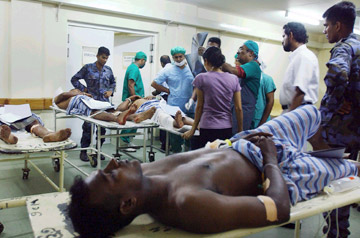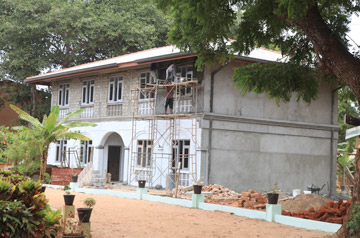|
Opinion:
Does the US practise what it preaches?
by K.M.H.C.B. Kulatunga
The United States brought two successive Resolutions against Sri
Lanka at the United Nations Human Rights Council (UNHRC), alleging human
rights violations during the final phase of Sri Lanka’s battle against
terrorism.
|

Air Force personnel injured when an LTTE light aircraft dropped
bombs in Colombo in 2008, being treated at a hospital. (File
photo) |
But Sri Lanka, as a sovereign nation, has every right to do so when
the lives of its 21 million people are at risk. Sri Lanka exercised that
right when the nation was in danger, subjecting to LTTE’s merciless
terrorist attacks.
Time is now opportune to question how reasonable the US has been with
its wild allegations against Sri Lanka at the UNHRC. Do they practise
what they preach? While the US goes that extra mile, or beyond that, in
the guise of their national security, they prevent sovereign nations
such as Sri Lanka from exercising its legitimate right to protect
civilians from terrorist attacks.
No-spy deal
In contrast, the UNHRC chief Navi Pillay who has been hard on Sri
Lanka, appears to be a toothless tiger when it comes to US drone attacks
in Pakistan which has killed hundreds of innocent civilians. But she
continues to harp on human rights of LTTE terrorists killed in action
while confronting Sri Lanka’s legitimate army.
The US has even gone to the extent of spying in Europe. Germany now
plans to send its top intelligence chiefs to Washington to 'push
forward' an investigation into allegations the US spied on its leader
Angela Merkel. The heads of foreign and domestic intelligence would hold
talks with the White House and the National Security Agency, a
government spokesperson said.
Germany and France said they want the United States to sign a no-spy
deal by the end of the year. Leaders of the European Union have warned
the US that a lack of trust could harm the fight against terrorism. As
well as the bugging of Mrs Merkel's phone, there are claims the NSA has
monitored millions of telephone calls by both German and French
citizens.
Spain followed Germany and France in summoning the US ambassador to
explain reports of spying on the country. Italy has also expressed anger
at reports it too has been spied on. US State Department has admitted
what they have done.
Foreign policy
Its spokesperson Jen Psaki acknowledged that the revelations - most
of them sourced to former US intelligence worker Edward Snowden - have
“posed a moment of tension with some of our allies”.
“We are having discussions with those allies, those will continue, as
is evidenced by the German delegation that will be coming here in the
coming weeks,” she was quoted as saying.
Psaki has said a review of US intelligence gathering, called for by
US President Barack Obama, would look at how it affects foreign policy.
|

A laboratory being built at Viyavilan MMV, Jaffna under the
government's 1,000 school laboratories project. (File photo) |
German Chancellor Merkel made clear her anger at the allegations,
which emerged in the German media, when she had arrived in Brussels on
Thursday for the EU Summit.
She has told reporters after the first day that “once the seeds of
mistrust have been shown it doesn't facilitate our co-operation... it
makes it more difficult”.
She said Germany would be pressing for a “joint understanding by the
end of the year for the co-operation of the (intelligence) agencies
between Germany and the US, and France and the US, to create a framework
for the co-operation”.
Meanwhile, Amnesty International (AI) has accused the United States
of unlawful killings in Pakistan which could amount to war crimes. The
world human rights watchdog, in a document titled “Will I be next US
drone strikes in Pakistan” accused the US of unlawful killings through
drone attacks in Pakistan.
It said that secrecy surrounding the drones program gives the US
administration a license to kill beyond the reach of the courts or basic
standards of international law. Hence, the IA urged the USA to come
clean about the drones program and hold those responsible for these
violations to account.
Mustafa Qadri, Amnesty International’s Pakistan Researcher has said
that the AI reviewed 45 known drone strikes in northwest Pakistan
between January 2012 and August 2013 and carried detailed research into
nine strikes which showed a serious violations of international law and
could in fact amount to war crimes or extra judicial killings.
Among the many documented killing of non-combatants is that of Mamano
Bibi, a 68-year-old grandmother killed by a Hellfire missile whilst
collecting vegetables in the family’s field surrounded by her
grandchildren. Her grandchildren told Amnesty three of her grandchildren
and a number of others were also wounded in the attack.
July 2012 witnessed an even deadlier attack in North Waziristan where
witness said a group of labourers had gathered for their evening meal
after work.
A volley of missiles hit the tent they had gathered in and then a
second strike hit those who came to help the wounded. Eighteen innocents
including a fourteen-year-old boy were killed in the attack. This was
not the only ‘rescuer attack’ - people who come to help the wounded,
themselves were targeted in rapid follow on attacks.
Genuine threats
Contrary to official claims that those killed were “terrorists”,
Amnesty International’s research showed the victims of the attacks were
not involved in fighting and posed no threat to life. Could the US find
any justification for these killings?
There are genuine threats to the USA and its allies in the region,
and drone strikes may be lawful in some circumstances. But the US should
bear in mind that other sovereign nations too enjoy the same right.
For an example, Sri Lanka’s Security Forces had been battling with
the most ruthless terrorist outfit in the world.
The LTTE had brutally killed thousands of hapless civilians and even
forcibly held over a half a million civilians as a human shield.
Hence, Sri Lanka had every right to crush the LTTE military as the
Tigers have unleashed nothing but misery to millions of people in every
corner of the country.
'Global war'
If the US is sincere with its battle against terrorism, they should
not suspect their European allies.
Could the US justify its spying in Europe? Won’t it affect the
worldwide battle against terrorism? If not, the so-called worldwide
battle against terrorism is intended at silencing countries which do not
dance to the White House melody?
The USA continues to rely on a 'global war' doctrine to attempt to
justify a borderless war with al-Qaida, the Taliban and those perceived
to be their allies.
The USA’s promise to increase transparency around drone strikes,
underscored by a major policy speech by President Barack Obama in May
2013, has yet to become a reality, and the USA still refuses to divulge
even basic factual and legal information.
This secrecy has enabled the USA to act with impunity and block
victims from receiving justice or compensation. Amnesty International
claims that no US official has ever been held to account for unlawful
killings by drones in Pakistan. Is this the transparency and
accountability the US often pontificates to countries such as Sri Lanka?
The United Sates has every right to protect its people, take every
possible step within the legitimate framework. But what we try to point
out is that Sri Lanka too enjoys similar inalienable right.
Peaceful
The LTTE is notorious for the most ruthless terrorist attacks in the
world and mass-scale killings than any other terrorist outfit in the
world. Hence, Sri Lanka had the every right to crush the LTTE at any
cost to secure the lives of over 21 million people. Isn’t that more
important than human rights of a few Tiger terrorists killed in action?
Having emerged from a three decade long battle against terrorism in
little over four years ago, Sri Lanka today is one of the most peaceful
and stable countries in the world. It is also a country in the midst of
a widespread and far reaching economic development thrust. What is
required at this time is for all stakeholders to work together with
vision, dedication and commitment to drive the nation's development.
As Secretary to the Ministry of Defence and Urban Development
Gotabaya Rajapaksa has pointed out at the inaugural National Engineering
Conference 2013, when all options for a peaceful settlement had been
exhausted, Sri Lanka had no option but the crush the LTTE militarily.
President Mahinda Rajapaksa had the foresight, courage and confidence
to launch the humanitarian operation and as a result, peace and
stability has been restored within just three and a half years. This is
the impact that positive thinking and bold decisions can have.
With the dawn of peace, the Government is working hard to develop Sri
Lanka and a key part of this effort is the uplifting of Colombo into a
clean, green, people friendly, world-class city.
Five years ago, we could never have thought of hosting an
international summit with top Heads of States in the world.
But Sri Lanka has now got an opportunity to host the biggest
international summit since the 1976 Non-Aligned Summit when Colombo
hosts the Commonwealth Heads of Government (CHOGM) meeting next month.
It’s time the world leaders have a closer look at Sri Lanka and the
dividends of peace enjoyed by one and all. Leaders of the Commonwealth
states will get an ideal opportunity to verify the truth of claims made
by the LTTE rump.
They could gain first-hand experience on the peaceful coexistence
among all communities.
It is time that the international community gets a true and broader
picture on Sri Lanka, without digging old wounds and making a big hue
and cry over the co-called human rights violations. |

